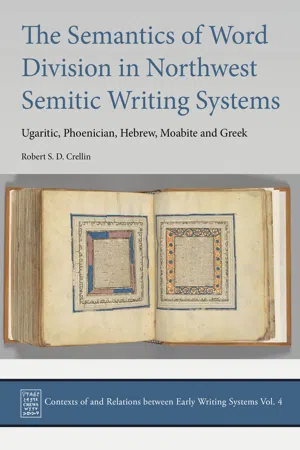
The Semantics of Word Division in Northwest Semitic Writing Systems
Ugaritic, Phoenician, Hebrew, Moabite and Greek
Robert S.D. Crellin
- 256 Seiten
- English
- ePUB (handyfreundlich)
- Über iOS und Android verfügbar
The Semantics of Word Division in Northwest Semitic Writing Systems
Ugaritic, Phoenician, Hebrew, Moabite and Greek
Robert S.D. Crellin
Über dieses Buch
Much focus in research on alphabetic writing systems has been on correspondences between graphemes and phonemes. The present study sets out to complement these by examining the linguistic denotation of markers of word division in several ancient Northwest Semitic (NWS) writing systems, namely, Ugaritic, Phoenician, Moabite, and Hebrew, as well as alphabetic Greek. While in Modern European languages words on the page are separated on the basis of morphosyntax, I argue that in most NWS writing systems words are divided on the basis of prosody: 'words' are units which must be pronounced together with a single primary accent or stress, or as a single phrase. After an introduction providing the necessary theoretical groundwork, Part I considers word division in Phoenician inscriptions. I show that word division at the levels of both the prosodic word and of the prosodic phrase may be found in Phoenician, and that the distributions match those of prosodic words and prosodic phrases in Tiberian Hebrew. The latter is a source where, unlike the rest of the material considered, the prosody is well represented. In Part II, word division in Ugaritic alphabetic cuneiform is analyzed. Here two-word division strategies are identified, corresponding broadly to two genres of text: viz, literary, and administrative documents. Word division in the orthography of literary and of some other texts separates prosodic words. By contrast, in many administrative (and some other) documents, words are separated on the basis of morphosyntax, anticipating later word division strategies in Europe by several centuries. Part III considers word division in the consonantal text of the Masoretic tradition of Biblical Hebrew. Here word division is found to mark out 'minimal prosodic words'. I show that this word division orthography is also found in early Moabite and Hebrew inscriptions. Word division in alphabetic Greek inscriptions is the topic of Part IV. Whilst it is agreed that word division marks out prosodic words, the precise relationship of these units to the pitch accent and the rhythm of the language is not so clear, and consequently this issue is addressed in detail. Finally, the Epilogue considers the societal context of word division in each of the writing systems examined, to attempt to discern the rationales for the prosodic word division strategies adopted. Contexts of and Relations between Early Writing Systems (CREWS) is a project funded by the European Research Council under the European Union's Horizon 2020 research and innovation program (grant agreement No. 677758), and based in the Faculty of Classics, University of Cambridge.